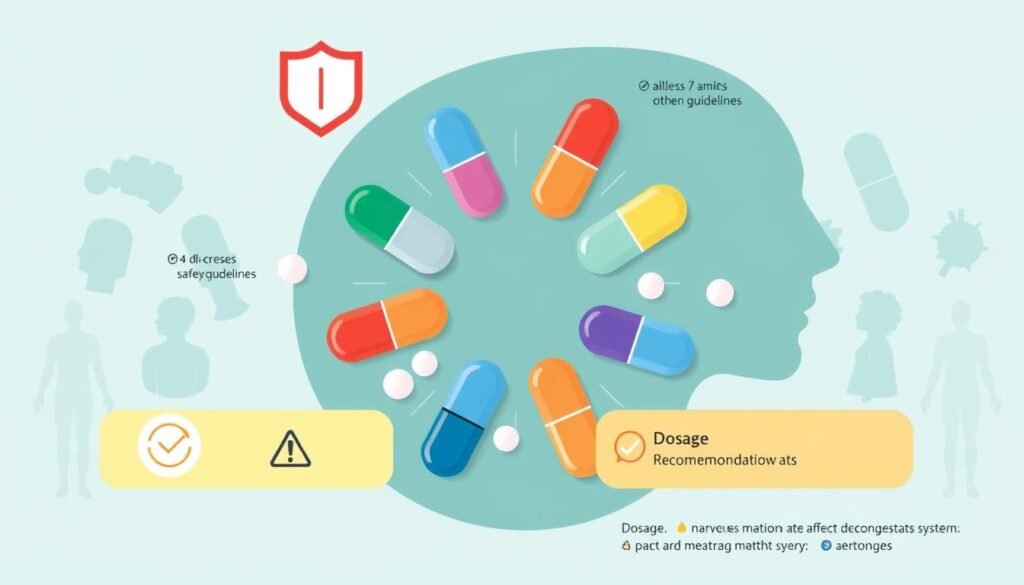Did you know up to 30% of people who use nasal decongestants might see side effects on their brain and nerves? This shows the deep impact these common meds can have. Though they help clear your nose quickly during allergy seasons, they also bring brain health risks and benefits. Knowing how decongestants work on your brain is key. It helps balance the good effects with the possible bad outcomes. This article looks into how these stimulants work, their action plan, and safe use over time.
New research shows nasal decongestants deeply affect our body and mind. They make life better for many. Yet, it’s important to know all about their effects. This is especially true for groups who might see more side effects.
Key Takeaways
- Nasal decongestants can strongly touch the central nervous system, causing various side effects.
- Up to 30% of users may face CNS side effects with these meds.
- Knowing how they work is key in weighing pros and cons.
- Certain groups may have more risks with decongestant use.
- Being smart about dosage and drug interactions ensures safe use.
Understanding Nasal Decongestants
Nasal decongestants help with symptoms from colds, allergies, and sinus infections. They come in two types: oral and topical. Oral decongestants include pseudoephedrine. Topical ones, like oxymetazoline, are found in nasal sprays. They both work by shrinking blood vessels in the nose. This reduces swelling and lets you breathe better.
Oral decongestants work throughout the body. Topical ones, applied directly in the nose, are less likely to cause side effects. Thus, oxymetazoline is often chosen for quick, short-term relief.
- Pseudoephedrine: A well-known oral decongestant, it can increase heart rate and cause anxiety. People with certain health issues should use it cautiously.
- Oxymetazoline: Great for fast relief, this topical decongestant shouldn’t be used too long. Using it too much can lead to a condition called rhinitis medicamentosa.
Decongestants are a big help in making breathing easier. Breathing well is important for feeling good. Knowing about the different types of decongestants can help you pick the right one. Just remember, using them too much can have downsides.
The Mechanism of Action in the Body
Decongestants kick in by turning on the body’s fight mode. This leads to narrowing of the blood vessels. Especially in the nose area. This knowledge is key to understanding how relief from a stuffy nose happens.
Drugs like pseudoephedrine act like the body’s emergency response. They tighten blood vessels when taken. This cuts down swelling in the nose, easing congestion and sinus pressure.
The way decongestants work can have broad effects, such as raising blood pressure. And they might affect the brain. So, it’s important to use them with care. Always balance the benefits with the side effects.
The effect of decongestants on the central nervous system
Decongestants help with nasal congestion quickly, but their effect on the central nervous system (CNS) needs attention. These medications make breathing easier and can help you sleep better. Yet, they have short-term side effects that could affect brain health.
Short-term Effects on Brain Health
Decongestants like phenylephrine and pseudoephedrine may raise blood pressure and heart rate. These changes can impact emotional well-being and mental focus. There have been cases where these stimulants led to mood swings.
In one case, a young man with bipolar disorder had issues due to cold medicine. This caused mood disruptions, leading to a manic episode. He needed specific treatments to stabilize his mood.
Long-term Risks and Considerations
Using decongestants over a long period brings additional risks. High doses or long-term use might cause serious problems. Research links too much use with issues like strokes. Since decongestants act like amphetamines, they can trigger manic episodes, especially in those already at risk.
It’s important for people with existing conditions to know these risks. This knowledge helps with safe use of decongestants.
| Medication | Short-term Effects | Long-term Risks |
|---|---|---|
| Pseudoephedrine | Increased heart rate, anxiety | Possible stroke risk, mood disorders |
| Phenylephrine | Elevated blood pressure, agitation | Long-term psychiatric disturbances |
| Ephedrine | Enhanced norepinephrine release, hyperactivity | Psychiatric episodes, increased stroke risk |
Knowing the short-term and long-term effects of decongestants helps people make better health choices. To learn more about how emotional health and lack of sleep can affect you, click here.
Common Types of Decongestants
Nasal and systemic decongestants help those with congestion from colds or allergies. Knowing the different types can help people choose the right one for them. There are two common decongestants, Pseudoephedrine and oxymetazoline. Each has its own benefits and uses. Let’s explore both.
Pseudoephedrine: Uses and Effects
Pseudoephedrine is found in cold and allergy meds. It makes blood vessels in the nose smaller. This helps reduce swelling and congestion. But, it can cause dizziness, sleep problems, and a fast heart rate. It’s important not to use pseudoephedrine for too long. Using it too much can hurt the nose’s lining and cause more congestion.
Oxymetazoline: How It Works in Nasal Sprays
Oxymetazoline is in nasal sprays. It works right where you need it, unlike pseudoephedrine. It shrinks blood vessels in the nose. This helps clear up congestion fast. But, it can have side effects and cause dependency if used too much. It can also raise blood pressure. Always check with a doctor before using it, especially if you have health problems.

Sympathomimetic Drugs and Their Impact
Sympathomimetic drugs are key in modern medicine, used for many FDA-approved reasons. They are given for heart problems, asthma, COPD, and allergies. These drugs also help with some brain, mood, and hormone issues.
Their work involves connecting with special body receptors. This starts a series of body responses that treat health problems. The way these drugs are given can be oral, on the skin, or breathed in. This lets doctors pick the best way for each case.
However, these drugs can have negative side effects. Issues like high blood pressure, fast heartbeat, and feeling restless are common. In people with certain health conditions, the risks can be higher. Some conditions require careful watching by doctors.
Nasal decongestants like phenylephrine and pseudoephedrine are widely used. They’re good at easing congestion. But they may cause mental health side effects in some people. Studies show that these side effects could mimic mania due to certain brain chemicals.
To wrap up, sympathomimetic drugs have a big role in treating many conditions. Their benefits in clearing congestion are well-known. But, it’s important to use them wisely because of the risks they might bring.
Impact on Blood Flow and the CNS
Decongestants affect blood flow, which can impact the central nervous system (CNS) significantly. These medications work by narrowing blood vessels. This helps with nasal drainage. However, this narrowing also means less blood flow to important areas, like the brain. This could lead to neurological problems, as shown in studies.
A study with 22 healthy male athletes looked at pseudoephedrine (PSE). It found that PSE improved the strength in knee extension exercises. The athletes showed more power with PSE than with a placebo. After intense exercises, their heart rates went up, suggesting more CNS activity.
The following table summarizes relevant findings about the effects of various decongestants on blood flow and associated CNS effects:
| Decongestant Type | Primary Effect | Impact on Blood Flow | CNS Effects |
|---|---|---|---|
| Pseudoephedrine | Vasoconstriction | May decrease blood flow to the brain | Heightened alertness, potential nervousness |
| Oxymetazoline | Nasal decongestion | Local vasoconstriction, transient effects | Commonly non-systemic, less CNS effect |
| Topical Steroid Decongestants | Anti-inflammatory | Minimal immediate effect | Less impact on CNS, prolonged use can have effects |
It’s important to understand how decongestants affect our bodies. Making informed choices about using these drugs is crucial. People should watch how their bodies react to avoid problems with blood flow and CNS effects.

Adverse Effects Linked to Decongestant Use
Using decongestants to clear a stuffy nose might have drawbacks. These effects can mess with your day and health. People with certain health issues should be extra careful, as their risks are higher.
Insomnia and Agitation
Using decongestants can lead to sleeplessness and feeling on edge. This can throw off your day and hurt your mental wellness. If sleep troubles get bad, think carefully if you should keep taking the medicine. The NHS talks about how decongestants might cause insomnia, showing it’s a big deal.
Hypertension Risks
Rising blood pressure is a big worry with decongestants. For some, a small jump in pressure is no problem. But for those with heart issues or high blood pressure, the danger is real. Knowing the risks is key, especially if you plan to use these drugs a lot. Sometimes, not watching out for side effects has led to seizures and other serious issues.
| Adverse Effect | Description | Risk Level |
|---|---|---|
| Insomnia | Difficulty in falling or staying asleep, impacting daily functioning. | Moderate |
| Agitation | Increased restlessness or anxiety; may lead to impaired focus. | Moderate |
| Hypertension | Elevated blood pressure levels that can exacerbate cardiovascular conditions. | High |
| Seizures | Rare but severe, possibly leading to long-term neurological effects. | Critical |
| Blurred Vision | Visual disturbances linked to vascular changes in the brain. | Moderate |
Specific Populations at Risk for Side Effects
Some people are more likely to encounter significant decongestant side effects. Those with heart disease, high blood pressure, or diabetes must be careful. They should also pay attention if they’re on certain medications as bad reactions might increase.
The way a decongestant is used matters a lot. Oral decongestants spread through the body more and can raise heart rates and blood pressure. Studies showed using these drugs can bump up heartbeats by almost 3 a minute.
Those considered at higher risk also include people with diseases of the brain or immune system. They might react strongly to these meds. It’s vital to follow how much and how often you use them, especially nasal sprays, which should be limited to twice a day for no more than three days.
While most don’t face serious problems, some folks are more at risk. Orally taken decongestants have been tied to more heart problems and strokes than nasal sprays. It’s crucial for anyone at risk to talk to a doctor. This way, they can get advice that is safe and helps with their issues.
| Population at Risk | Potential Issues |
|---|---|
| Cardiovascular Disease | Increased heart rate and blood pressure |
| Hypertension | Heightened blood pressure reactions |
| Diabetes | Possible sugar level fluctuations |
| Neurodegenerative Conditions | Exacerbation of existing symptoms |
| Autoimmune Disorders | Enhanced sensitivity to medications |
Comparative Analysis: Oral vs. Nasal Decongestants
It’s crucial to know the differences between oral and nasal decongestants when treating nasal congestion. Oral decongestants, like phenylephrine, and nasal decongestants like oxymetazoline have their unique benefits and effects.
Oral decongestants provide relief from nasal congestion caused by colds, allergies, or other upper respiratory issues. Phenylephrine hydrochloride 10 mg is available over-the-counter in the U.S. However, research shows it might not be more effective than a placebo. Though not life-threatening, side effects such as headaches and discomfort can occur.
Nasal decongestants offer quick relief and are used by almost half of the people with nasal blockages. Many choose sprays like Otrivin. Most users follow the advice to use them for no more than five days, which helps prevent dependence and side effects.
| Decongestant Type | Active Ingredient | Effectiveness | Common Side Effects | Usage Duration |
|---|---|---|---|---|
| Oral | Pseudoephredrine | Low efficacy compared to placebo | Headaches, mild discomfort | Varies; generally less than 10 days |
| Nasal | Oxymetazoline | Fast relief, effective for nasal congestion | Temporary burning, sneezing | Typically used for less than 5 days |
Comparing oral and nasal decongestants shows both their pros and cons. Knowing your health and what you specifically need helps choose the best decongestant for effective relief.
Dosage Recommendations and Safety Guidelines
When using decongestants, it’s crucial to follow dosage recommendations and safety guidelines closely. This ensures the drugs are both safe and effective. Not following the correct dosing frequency, especially with drugs like pseudoephedrine and phenylephrine, is risky. High doses can lead to severe side effects, such as high blood pressure and kidney damage.
Adults and children over 12 should take 1-2 capsules or tablets every four to six hours. For children aged 4 to 12, the dose is 1 tablet or up to 2 teaspoonfuls of liquid every four hours. It’s important to watch closely for any negative effects. Children under 4 should not use over-the-counter cough and cold medicines due to severe side effects risk.
Decongestants are available in capsules, tablets, and liquid forms. This makes it easy to administer the medication. If you miss a dose, take it as soon as you remember, unless your next dose is near. In that case, just skip the missed dose.
Using these medications can sometimes cause dizziness, nervousness, or drowsiness. If you experience symptoms of an overdose, like severe stomach pain or an irregular heartbeat, get medical help right away. Storing medications correctly is also vital. Keep them in a closed container, at room temperature, and away from too much heat or moisture.
Keeping these tips in mind helps avoid problems while benefiting from the medicine. For more info on decongestants’ safe and effective use, consider talking to healthcare professionals. You can also check out resources from OpenTextBC or Biotin Bloom.

| Population | Dosage | Frequency |
|---|---|---|
| Adults and Children 12+ | 1-2 capsules/tablets | Every 4-6 hours |
| Children 4-12 | 1 tablet or 1-2 teaspoons of liquid | Every 4 hours |
Consulting Healthcare Professionals
Talking to healthcare experts before using over-the-counter nasal decongestants is key. It ensures your safety and the product’s effectiveness. People with existing health issues need advice tailored to them. This helps prevent harmful side effects. A comprehensive health check-up highlights critical factors:
- Assessment of Medical History: Knowing a patient’s past health issues flags possible risks.
- Medication Advice: Doctors check how decongestants might mix with current medicines for safety.
- Alternative Treatment Suggestions: If decongestants are risky, doctors can offer other ways to ease symptoms.
Stats shed light on using cough and cold remedies, especially in kids. The Consumer Healthcare Products Association (CHPA) suggests not giving OTC cough and cold treatments to kids under four. Interestingly, 10% of kids under 18 used these drugs in the last week. Many chose meds that treat multiple symptoms. This is troubling because over half of these meds mix antihistamines with decongestants.
Most parents, 86%, try OTC meds before seeing a doctor for their kids. This habit is concerning. Many emergency visits happen because of side effects from these cough and cold medicine combos. Getting advice from healthcare professionals is invaluable. They offer specific advice and strategies to safely use these medicines.
Recent Studies and Findings
Recent studies shed light on decongestants and their health risks. They show both good and bad effects, especially in certain groups.
Clinical Research Overview
Research has focused on pseudoephedrine, found in nasal decongestants. It looks at how it affects rats’ brains under certain conditions. This research shows a risk of seizures in divers breathing certain air mixes.
A study with about 3,000 people found no strong link between decongestants and heart attacks or strokes. The effect on heart rate and blood pressure was small and not worrying.
Case Studies Involving Adverse Reactions
Case studies highlight the dangers of nasal decongestants for some people. Those with heart disease, diabetes, or brain disorders are at higher risk. Long-term use can damage nasal tissues and cause more congestion.
There’s a difference between oral decongestants and nasal sprays. Oral ones like pseudoephedrine are linked to more heart issues. However, these findings are key to safe decongestant use.
Conclusion
Decongestants can relieve nasal congestion, but it’s important to know about the CNS impact. These drugs, like pseudoephedrine, offer quick relief but come with risks. People with health issues such as high blood pressure or anxiety should be cautious. Their symptoms might get worse because these drugs act as stimulants.
With over 43,000 accesses and 8 citations, this article highlights the need to weigh the good against the bad. Decongestants can raise heart rate and blood pressure. This is something active people and young users should think about. Before using decongestants, talking to a doctor is a wise choice.
Decongestants can make cold symptoms better, but knowing the risks is key. Safety, understanding personal health, and potential risks make this topic complex. Users should be careful to use these drugs safely and effectively.